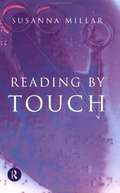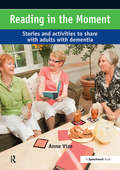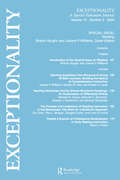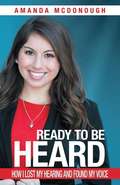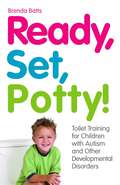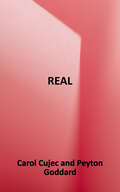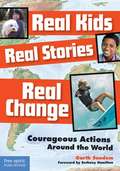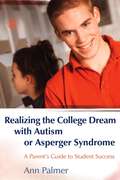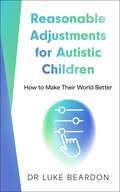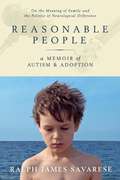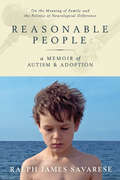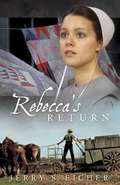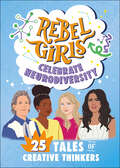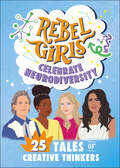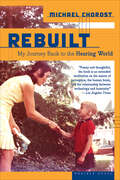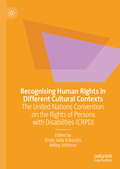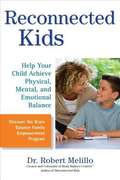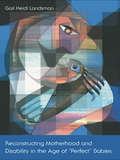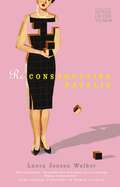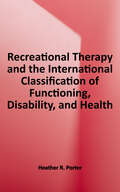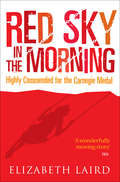- Table View
- List View
Reading by Touch
by Susanna MillarThe perceptual, linguistic and cognitive processes involved in sighted reading have been widely studied, but the use of touch raises new issues. Drawing on her research with novice and fluent braille readers, Susanna Millar examines how people initially process braille and how skill with sounds, words, meaning and spelling patterns influence processing. The main focus is on braille, but findings on the "Moon" script, vibrotactile devices, maps and icons are also considered in the context of their practical implications and access to computer technology.
Reading in the Moment: Activities and Stories to Share with Adults with Dementia
by Anne VizeStudies have shown that reading in a melodic and rhythmic voice can produce positive changes in mood, emotion and behaviour in those with dementia. This book features: a detailed section on the background of how and what to read to those with dementia, as well as the research behind bibliotherapy.
Reading: A Special Issue of Exceptionality
by Sharon Vaughn Joanna P. WilliamsFirst Published in 2004. Routledge is an imprint of Taylor & Francis, an informa company.
Ready To Be Heard: How I Lost My Hearing And Found My Voice
by Amanda McDonoughWhen author Amanda McDonough started losing her hearing at the age of 4 she swore her parents to secrecy. She hid her hearing loss for 18 years from her friends, family, teachers, and acquaintances. As the author grew older, her hearing gradually decreased, causing her to begin struggling in school, in her relationships with family and friends, and with her identity. By age twenty-two, she could no longer rely on her wit to hide her hearing loss. She became one hundred percent deaf in both ears. Amanda found herself unable to hear, talk, lip-read or sign. Her only method of communication with the world was through writing. Ready to be Heard is the story of how Amanda taught herself to speak again, to lip-read, and to sign. McDonough explains how she discovered a new culture, language, and most importantly, herself. In this memoir, the author narrates how she managed to finish college after becoming deaf. How she garnered straight As in school, entered the workforce, enjoyed a successful Hollywood acting career (Freeforms Switched at Birth, ABCs Speechless, NBCs Bad Judge, Google, 7UP, Deaf West/ Pasadena Playhouses Our Town, etc.), fought for her independence, and found her purpose. Ready to be Heard tells about the authors journey to find a balance between the hearing world she was raised in and the Deaf culture to which she now belonged.
Ready, Set, Potty!
by Brenda BattsPotty training a child with developmental disorders can be a real challenge, and sometimes the extra difficulties make you feel as though you've tried everything, and failed. In this book, Brenda Batts shows how you can overcome problems, big and small, and provides tried and tested methods that really work, tailored to each individual child. Bursting with ideas on how to see past conventional strategies and adapt toilet training to suit your child, this book outlines methods that have helped even the most despairing of parents and caregivers. Examples of success stories range from two-year-olds to adults aged 20, and show that no matter how difficult it may seem, a little creativity and adaptation can get anyone toilet trained, however many previous attempts have failed. The program itself is supported by plenty of helpful hints and tips, as Brenda covers all you need to get your child past the diaper stage and help them to achieve a big step towards independence. This book is a must for anybody looking to toilet train someone with developmental disorders.
Real
by Carol Cujec Peyton Goddard"Sometimes Charity cannot control her body and because she has low-functioning autism, Charity cannot communicate her thoughts to anyone else, even though she feels all of the frustrations, fears, and doubts of a typical thirteen-year-old."
Real Kids, Real Stories, Real Change: Courageous Actions around the World
by Garth SundemEleven-year-old Tilly saved lives in Thailand by warning people that a tsunami was coming. Fifteen-year-old Malika fought against segregation in her Alabama town. Ten-year-old Jean-Dominic won a battle against pesticides--and the cancer they caused in his body. Six-year-old Ryan raised $800,000 to drill water wells in Africa. And twelve-year-old Haruka invented a new environmentally friendly way to scoop dog poop. With the right role models, any child can be a hero. Thirty true stories profile kids who used their heads, their hearts, their courage, and sometimes their stubbornness to help others and do extraordinary things. As young readers meet these boys and girls from around the world, they may wonder, "What kind of hero lives inside of me?"
Realizing the College Dream with Autism or Asperger Syndrome: A Parent's Guide to Student Success
by Ann PalmerRealizing the College Dream with Autism or Asperger Syndrome is both a practical and a personal account of one ASD student's successful experience of going to college. This accessible book focuses on how to get there and stay there: deciding to go, how to get in and how to get the most out of it. Ann Palmer advises parents and professionals how to prepare the student for the transition from school and home life to a new environment and educational challenge, and how to support them through potential problems such as academic pressure, living away from home, social integration and appropriate levels of participation in college. She offers helpful strategies that will encourage and inspire parents and students and show that college can be a suitable option for students with an autism spectrum disorder, as well as the basis for a successful independent life later. This book is essential reading for any parent considering college as an option for their child, disability service providers in colleges and for ASD students themselves.
Realizing the College Dream with Autism or Asperger Syndrome: A Parent's Guide to Student Success
by Ann PalmerRealizing the College Dream with Autism or Asperger Syndrome is both a practical and a personal account of one ASD student's successful experience of going to college.This accessible book focuses on how to get there and stay there: deciding to go, how to get in and how to get the most out of it. Ann Palmer advises parents and professionals how to prepare the student for the transition from school and home life to a new environment and educational challenge, and how to support them through potential problems such as academic pressure, living away from home, social integration and appropriate levels of participation in college. She offers helpful strategies that will encourage and inspire parents and students and show that college can be a suitable option for students with an autism spectrum disorder, as well as the basis for a successful independent life later.This book is essential reading for any parent considering college as an option for their child, disability service providers in colleges and for ASD students themselves.
Really Useful ASD Transition Pack
by Alis HawkinsUsing snippets of practice-based theory, this title provides an overview of considerations as diverse as sensory sensitivities and their impact on the school day, how interactions in the playground might be handled and whether the pupil is allowed to eat separately, as well as teaching and learning issues.
Reasonable Adjustments for Autistic Children: How to Make Their World Better
by Luke BeardonAutism acceptance has led to - at least, at surface level - an increased understanding of what autistic children need, and of what they find difficult to cope with. But is the world really making the kind of adjustments that would see your child truly thrive?In Reasonable Adjustments for Autistic Children acclaimed and much-loved author and expert Dr Luke Beardon sets out the full scope of what he sees as the essential adjustments we need to make to our homes, our schools and the wider world in order to allow our autistic young people to reach their full potential and be genuinely comfortable in each and every environment. From school uniform to train journeys and playdates, from dentists' surgeries to holiday resorts, Luke's book offers practical measures for adapting every environment or sensory situation. Absolutely essential reading for every parent of an autistic child, family member, caregiver, teacher or health and social care worker, this is a long-overdue book that has the potential to change the world for neurodiverse children, and for the children of generations to come.
Reasonable Adjustments for Autistic Children: How to Make Their World Better
by Luke BeardonAutism acceptance has led to - at least, at surface level - an increased understanding of what autistic children need, and of what they find difficult to cope with. But is the world really making the kind of adjustments that would see your child truly thrive?In Reasonable Adjustments for Autistic Children acclaimed and much-loved author and expert Dr Luke Beardon sets out the full scope of what he sees as the essential adjustments we need to make to our homes, our schools and the wider world in order to allow our autistic young people to reach their full potential and be genuinely comfortable in each and every environment. From school uniform to train journeys and playdates, from dentists' surgeries to holiday resorts, Luke's book offers practical measures for adapting every environment or sensory situation. Absolutely essential reading for every parent of an autistic child, family member, caregiver, teacher or health and social care worker, this is a long-overdue book that has the potential to change the world for neurodiverse children, and for the children of generations to come.
Reasonable People: A Memoir Of Autism And Adoption
by Ralph James SavareseWatch an interview with DJ on CNN Listen to Ralph Savarese's interview on NPR's "The Diane Rehm Show" Visit the book's website: www. reasonable-people. com "Why would someone adopt a badly abused, nonspeaking, six-year-old from foster care?" So the author was asked at the outset of his adoption-as-a-first-resort adventure. Part love story, part political manifesto about "living with conviction in a cynical time," the memoir traces the development of DJ, a boy written off as profoundly retarded and now, six years later, earning all "A's" at a regular school. Neither a typical saga of autism nor simply a challenge to expert opinion, Reasonable People illuminates the belated emergence of a self in language. And it does so using DJ's own words, expressed through the once discredited but now resurgent technique of facilitated communication. In this emotional page-turner, DJ reconnects with the sister from whom he was separated, begins to type independently, and explores his experience of disability, poverty, abandonment, and sexual abuse. "Try to remember my life," he says on his talking computer, and remember he does in the most extraordinarily perceptive and lyrical way. Asking difficult questions about the nature of family, the demise of social obligation, and the meaning of neurological difference, Savarese argues for a reasonable commitment to human possibility and caring.
Reasonable People: A Memoir of Autism and Adoption
by Ralph James SavareseWatch an interview with DJ on CNNListen to Ralph Savarese's interview on NPR's "The Diane Rehm Show"Visit the book's website: www.reasonable-people.com"Why would someone adopt a badly abused, nonspeaking, six-year-old from foster care?" So the author was asked at the outset of his adoption-as-a-first-resort adventure. Part love story, part political manifesto about "living with conviction in a cynical time," the memoir traces the development of DJ, a boy written off as profoundly retarded and now, six years later, earning all "A's" at a regular school. Neither a typical saga of autism nor simply a challenge to expert opinion, Reasonable People illuminates the belated emergence of a self in language. And it does so using DJ's own words, expressed through the once discredited but now resurgent technique of facilitated communication. In this emotional page-turner, DJ reconnects with the sister from whom he was separated, begins to type independently, and explores his experience of disability, poverty, abandonment, and sexual abuse. "Try to remember my life," he says on his talking computer, and remember he does in the most extraordinarily perceptive and lyrical way.Asking difficult questions about the nature of family, the demise of social obligation, and the meaning of neurological difference, Savarese argues for a reasonable commitment to human possibility and caring.
Rebecca's Return (The Adams County Series #2)
by Jerry S. EicherThe author, Jerry S. Eicher, continues the plot he began in Rebecca's Promise, Book 1 of the Adams County Trilogy. In Rebecca's Return, Book 2 of the Trilogy, the young Amish woman Rebecca Keim returns to Wheat Ridge full of resolve to make her relationship with John Miller work. But in her absence, John has become suspicious of Rebecca. Does she still love someone else? Before she can find peace with the past, John is caught up in a crisis of his own. Events spin out of control, and Rebecca is left to deal with the pieces. What is God's will for this couple, and is there any hope for the recovery of their love?
Rebel Girls Celebrate Neurodiversity: 25 Tales of Creative Thinkers (Rebel Girls Minis)
by Rebel GirlsTRUE STORIES OF NEURODIVERGENT ICONSThis collection features 25 inspiring tales of neurodivergent artists, athletes, innovators, and more. Read about how these women and girls thought creatively, achieved their dreams, and advocated for the rights of neurodivergent people everywhere.Walk the runway with Madeline Stuart, the first professional model with Down syndrome. Steal the scene with Salma Hayek, the award-winning actor with dyslexia. Learn how journalist and TV host Lisa Ling thrives with ADD, and how Temple Grandin&’s autism has opened up new and compassionate ways of interacting with animals.This book pairs inspiring, easy-to-read text with colorful full-page portraits created by female and nonbinary artists from all around the world. Plus, scannable codes let you listen to longer stories on the Rebel Girls app!
Rebel Girls Celebrate Neurodiversity: 25 Tales of Creative Thinkers (Rebel Girls Minis)
by Rebel GirlsTRUE STORIES OF NEURODIVERGENT ICONSThis collection features 25 inspiring tales of neurodivergent artists, athletes, innovators, and more. Read about how these women and girls thought creatively, achieved their dreams, and advocated for the rights of neurodivergent people everywhere.Walk the runway with Madeline Stuart, the first professional model with Down syndrome. Steal the scene with Salma Hayek, the award-winning actor with dyslexia. Learn how journalist and TV host Lisa Ling thrives with ADD, and how Temple Grandin’s autism has opened up new and compassionate ways of interacting with animals.This book pairs inspiring, easy-to-read text with colorful full-page portraits created by female and nonbinary artists from all around the world. Plus, scannable codes let you listen to longer stories on the Rebel Girls app!
Rebuilt: My Journey Back to the Hearing World
by Michael ChorostAfter Michael Chorost suddenly lost what was left of his hearing, he took the radical step of having a cochlear implant -- a tiny computer -- installed in his head. A technological marvel, the device not only restored to him the world of sound but also could be routinely upgraded with new software. Despite his intitial fear of the technology's potentially dehumanizing effects, Chorost's implant allowed him to connect with others in surprising ways: as a cyborg, he learned about love, joined a writing group, and formed deeper friendships. More profoundly, his perception of the world around him was dramatically altered. Brimming with insight and written with charm and self-deprecating humor, Rebuilt unveils, in personal terms, the astounding possibilities of a new technological age.
Recognising Human Rights in Different Cultural Contexts: The United Nations Convention on the Rights of Persons with Disabilities (CRPD)
by Kelley Johnson Emily Julia KakoullisThis book explores the journey of the United Nations Convention on the Rights of Persons with Disabilities (CRPD) as it is interpreted and translated from International Human Rights Law into domestic law and policy in different cultural contexts. Beginning with reflections on ‘culture’, ‘disability’ and ‘human rights’ from different disciplinary perspectives, the work is then organised as ‘snapshots’ of the journey of the CRPD from the international level to the domestic; the process of ratification, the process of implementation, and then the process of monitoring the CRPD’s implementation in States Parties cultural contexts. Leading global contributors provide cutting-edge accounts of the interactions between the CRPD and diverse cultures, revealing variations in the way that the concept of ‘culture’ is defined. This collection will appeal to academics and students in Law and Socio-Legal Studies, Disability Studies, Policy Studies and Social Work, Sociology, Anthropology; and those training to be service providers with persons with disabilities.
Reconnected Kids
by Melillo Dr RobertFinally, a lasting solution to behavior problems-for every child Reconnected Kids is a groundbreaking guide to help parents resolve their child's behavioral problems-without medication, strife, or drama. This empowering method shows parents how to first identify their own role in their child's behavior, and then how to guide the child to focus on goals, practice lifelong good habits, and stay motivated. This insightful and whole-family approach will help parents and kids reach their full potential.
Reconstructing Motherhood and Disability in the Age of Perfect Babies
by Gail LandsmanExamining mothers of newly diagnosed disabled children within the context of new reproductive technologies and the discourse of choice, this book uses anthropology and disability studies to revise the concept of "normal" and to establish a social environment in which the expression of full lives will prevail.
Reconstructing Natalie (Women Of Faith Ser.)
by Laura Jensen WalkerNatalie faces breast cancer with her friends, humor, girlfriends, and is a survivor. This is a story full of laughter, tears, hope and humor....<P><P> Natalie Moore is having a great time living her life until she confronts something that too many women fight in today's society: breast cancer. At twenty-seven years old, Natalie walks us through the emotions and reality of having breast cancer while she loses her boyfriend, her fair, and both of her breasts. She also shows us how to cope, as she makes new friends, gets reconstructive surgery that even enhances her figure, finds new love in unexpected places, and makes major changes in her life. Natalie learns to place importance in people in attributes other than the obvious and physical as she works on reconstructing herself.
Recreation Programming for Visually Impaired Children and Youth
by Jerry D. KelleyThe book is designed primarily for the recreation consultant or trainer concerned with assisting the community recreation leader in his or her efforts to provide recreation programs and services for the visually impaired child.
Recreational Therapy and The International Classification of Functioning, Disability, and Health
by Heather R. PorterThis book includes all of the codes in the 2016 version of the ICF. There is an overview of each of the ICF's four sections, Body Functions, Body Structure, Activities and Participation, and Environmental Factors, plus a description of Personal Factors. The purpose and scoring of each section are described with recreational therapy examples. Each chapter in the four sections is covered in more detail with a description of the code set, more detailed scoring examples, an assessment overview, and treatment directions. An evidence review demonstrates the efficacy of treating each set of codes.
Red Sky in the Morning: Highly Commended for the Carnegie Medal
by Elizabeth Laird"Quite simply, a wonderfully moving story about the power of love." --Times Educational Supplement "A wry first-person narrative. . . . Discussion of handicaps, death and bereavement, and religious belief are carefully integrated into the story."--School Library Journal Twelve-year-old Anna is looking forward to the birth of her baby brother. Ben arrives, but is disabled. Anna loves him immensely but she finds herself unable to admit the truth about Ben to her friends. Eventually the truth gets out and leads not to the ridicule Anna expected, but sympathy and understanding. Elizabeth Laird's award-winning young adult novels include A Little Piece of Ground and Crusade.
